An Analysis of the Sharing Economy: Passions and Interests Essay
VerifiedAdded on 2023/06/07
|24
|3805
|413
Essay
AI Summary
This essay provides a comprehensive analysis of the sharing economy, exploring its evolution, key characteristics, and impact on various stakeholders. It delves into the economic, technological, social, and political dynamics that have fueled the growth of this sector, including the rise of digital platforms and peer-to-peer transactions. The essay examines the benefits of the sharing economy, such as increased resource utilization, job creation, and consumer convenience, while also addressing the challenges and controversies associated with it. These include regulatory complexities, trust issues, security concerns, and the need for clear guidelines to protect consumers and businesses. The essay discusses the confusion surrounding the term 'sharing economy,' the need for adaptable laws, and the importance of building trust within these online platforms. It concludes by highlighting the need for ongoing evaluation and adaptation to ensure the sustainable growth of the sharing economy in the face of evolving consumer preferences and market dynamics.
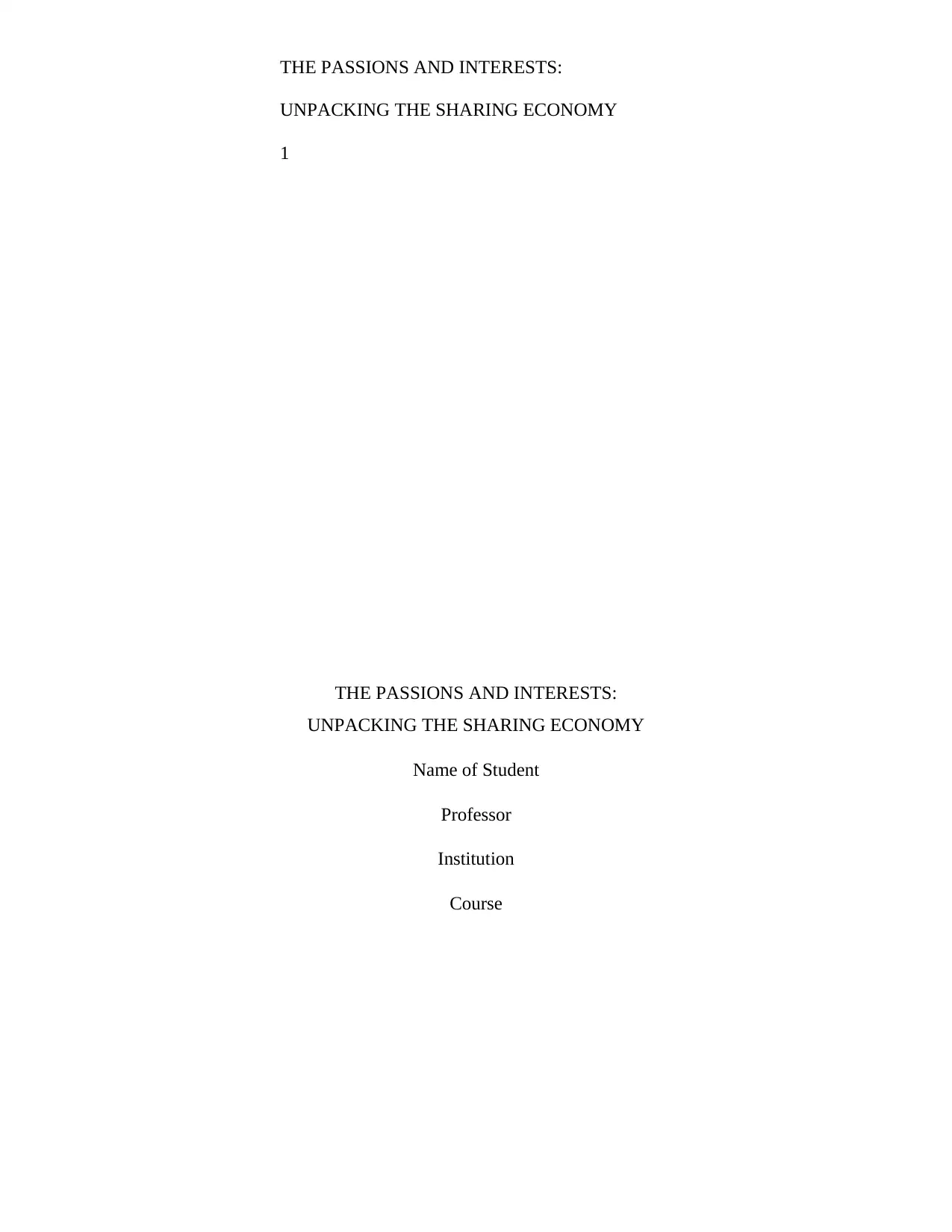
THE PASSIONS AND INTERESTS:
UNPACKING THE SHARING ECONOMY
1
THE PASSIONS AND INTERESTS:
UNPACKING THE SHARING ECONOMY
Name of Student
Professor
Institution
Course
UNPACKING THE SHARING ECONOMY
1
THE PASSIONS AND INTERESTS:
UNPACKING THE SHARING ECONOMY
Name of Student
Professor
Institution
Course
Paraphrase This Document
Need a fresh take? Get an instant paraphrase of this document with our AI Paraphraser
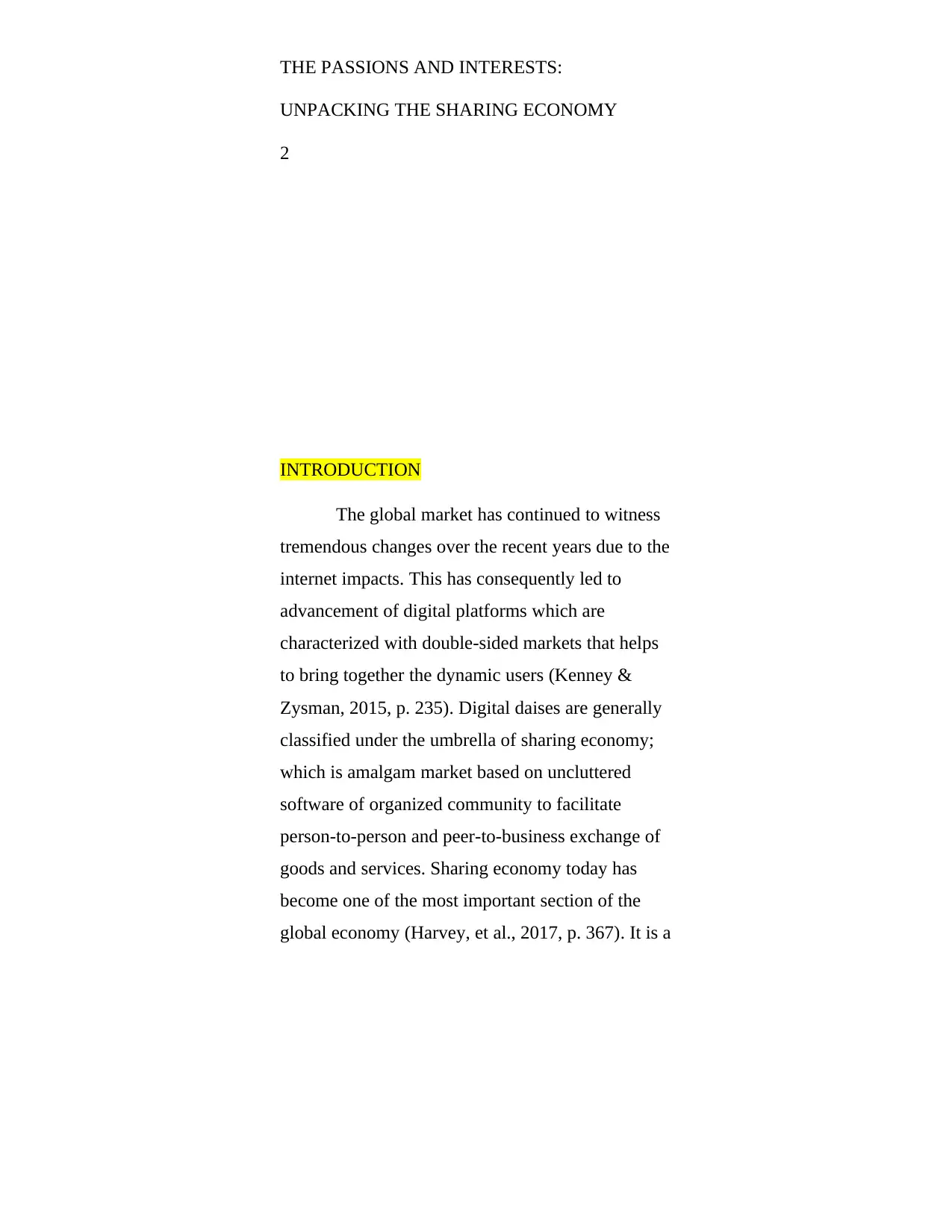
THE PASSIONS AND INTERESTS:
UNPACKING THE SHARING ECONOMY
2
INTRODUCTION
The global market has continued to witness
tremendous changes over the recent years due to the
internet impacts. This has consequently led to
advancement of digital platforms which are
characterized with double-sided markets that helps
to bring together the dynamic users (Kenney &
Zysman, 2015, p. 235). Digital daises are generally
classified under the umbrella of sharing economy;
which is amalgam market based on uncluttered
software of organized community to facilitate
person-to-person and peer-to-business exchange of
goods and services. Sharing economy today has
become one of the most important section of the
global economy (Harvey, et al., 2017, p. 367). It is a
UNPACKING THE SHARING ECONOMY
2
INTRODUCTION
The global market has continued to witness
tremendous changes over the recent years due to the
internet impacts. This has consequently led to
advancement of digital platforms which are
characterized with double-sided markets that helps
to bring together the dynamic users (Kenney &
Zysman, 2015, p. 235). Digital daises are generally
classified under the umbrella of sharing economy;
which is amalgam market based on uncluttered
software of organized community to facilitate
person-to-person and peer-to-business exchange of
goods and services. Sharing economy today has
become one of the most important section of the
global economy (Harvey, et al., 2017, p. 367). It is a
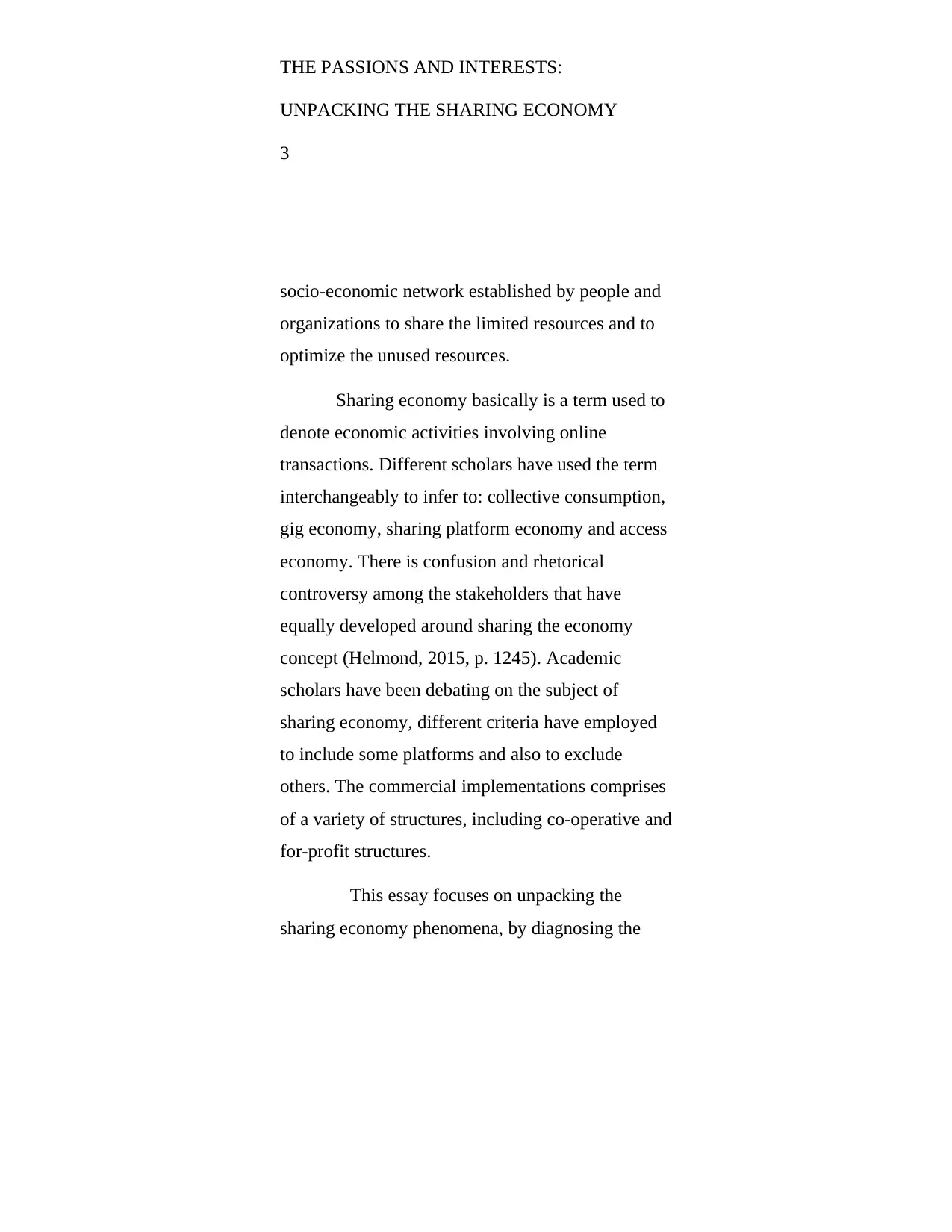
THE PASSIONS AND INTERESTS:
UNPACKING THE SHARING ECONOMY
3
socio-economic network established by people and
organizations to share the limited resources and to
optimize the unused resources.
Sharing economy basically is a term used to
denote economic activities involving online
transactions. Different scholars have used the term
interchangeably to infer to: collective consumption,
gig economy, sharing platform economy and access
economy. There is confusion and rhetorical
controversy among the stakeholders that have
equally developed around sharing the economy
concept (Helmond, 2015, p. 1245). Academic
scholars have been debating on the subject of
sharing economy, different criteria have employed
to include some platforms and also to exclude
others. The commercial implementations comprises
of a variety of structures, including co-operative and
for-profit structures.
This essay focuses on unpacking the
sharing economy phenomena, by diagnosing the
UNPACKING THE SHARING ECONOMY
3
socio-economic network established by people and
organizations to share the limited resources and to
optimize the unused resources.
Sharing economy basically is a term used to
denote economic activities involving online
transactions. Different scholars have used the term
interchangeably to infer to: collective consumption,
gig economy, sharing platform economy and access
economy. There is confusion and rhetorical
controversy among the stakeholders that have
equally developed around sharing the economy
concept (Helmond, 2015, p. 1245). Academic
scholars have been debating on the subject of
sharing economy, different criteria have employed
to include some platforms and also to exclude
others. The commercial implementations comprises
of a variety of structures, including co-operative and
for-profit structures.
This essay focuses on unpacking the
sharing economy phenomena, by diagnosing the
⊘ This is a preview!⊘
Do you want full access?
Subscribe today to unlock all pages.

Trusted by 1+ million students worldwide
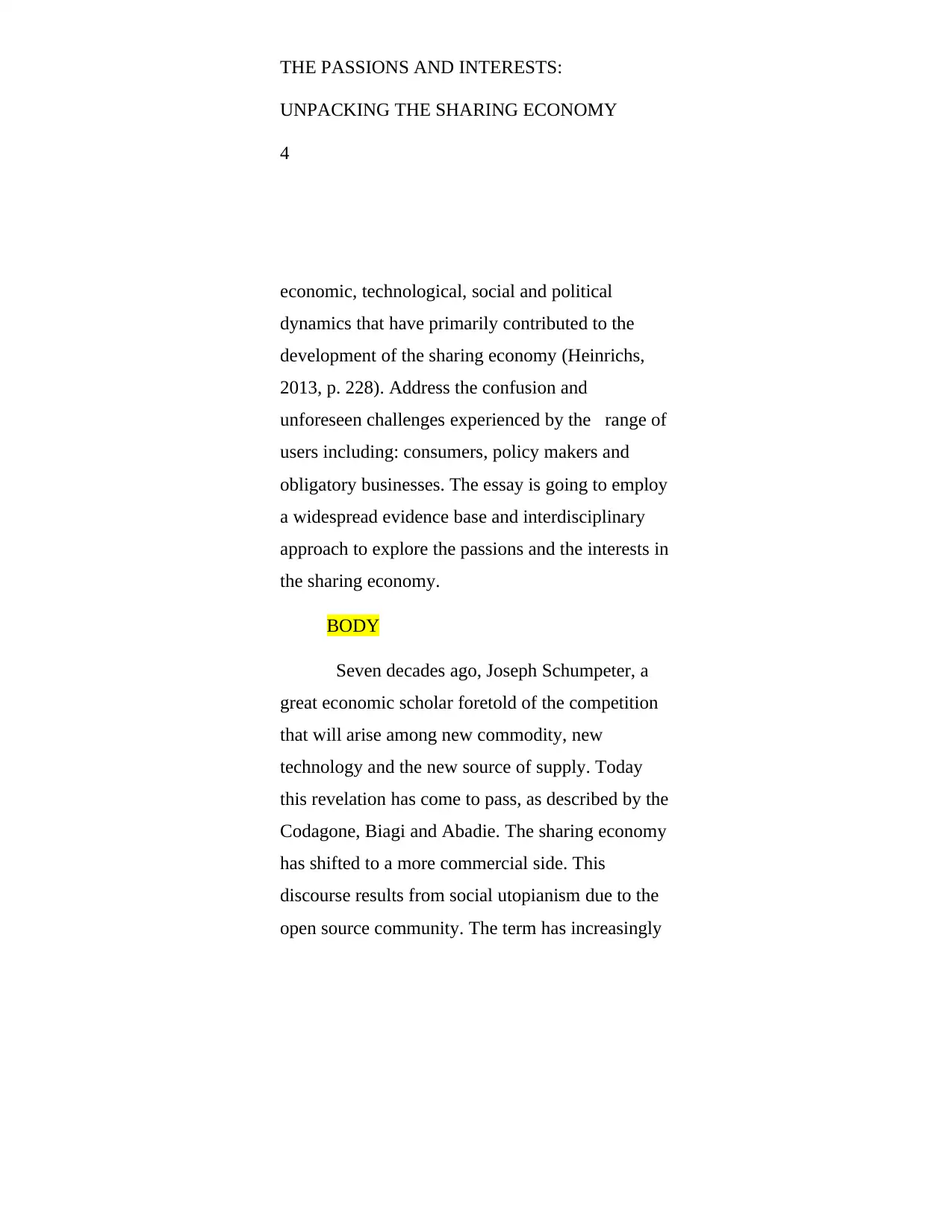
THE PASSIONS AND INTERESTS:
UNPACKING THE SHARING ECONOMY
4
economic, technological, social and political
dynamics that have primarily contributed to the
development of the sharing economy (Heinrichs,
2013, p. 228). Address the confusion and
unforeseen challenges experienced by the range of
users including: consumers, policy makers and
obligatory businesses. The essay is going to employ
a widespread evidence base and interdisciplinary
approach to explore the passions and the interests in
the sharing economy.
BODY
Seven decades ago, Joseph Schumpeter, a
great economic scholar foretold of the competition
that will arise among new commodity, new
technology and the new source of supply. Today
this revelation has come to pass, as described by the
Codagone, Biagi and Abadie. The sharing economy
has shifted to a more commercial side. This
discourse results from social utopianism due to the
open source community. The term has increasingly
UNPACKING THE SHARING ECONOMY
4
economic, technological, social and political
dynamics that have primarily contributed to the
development of the sharing economy (Heinrichs,
2013, p. 228). Address the confusion and
unforeseen challenges experienced by the range of
users including: consumers, policy makers and
obligatory businesses. The essay is going to employ
a widespread evidence base and interdisciplinary
approach to explore the passions and the interests in
the sharing economy.
BODY
Seven decades ago, Joseph Schumpeter, a
great economic scholar foretold of the competition
that will arise among new commodity, new
technology and the new source of supply. Today
this revelation has come to pass, as described by the
Codagone, Biagi and Abadie. The sharing economy
has shifted to a more commercial side. This
discourse results from social utopianism due to the
open source community. The term has increasingly
Paraphrase This Document
Need a fresh take? Get an instant paraphrase of this document with our AI Paraphraser
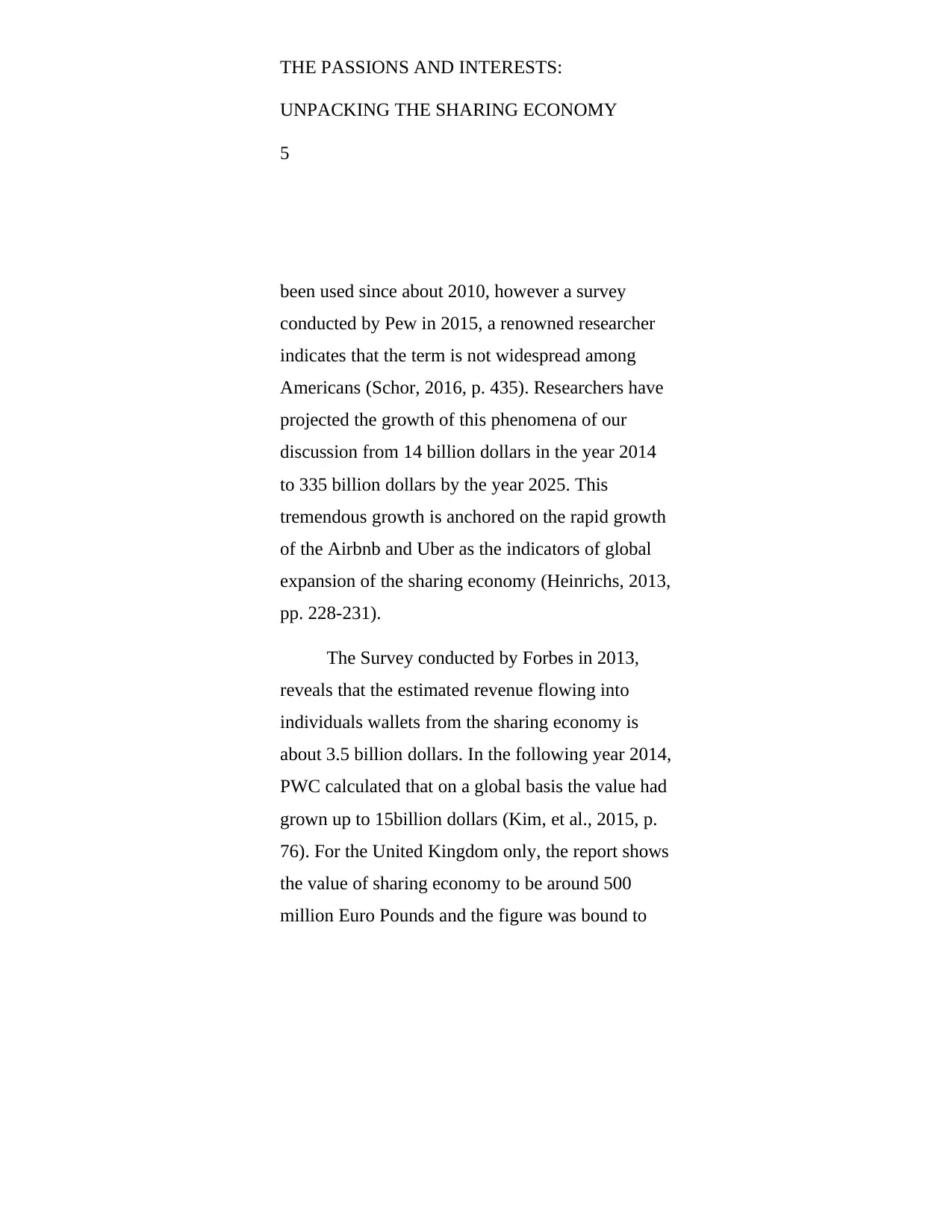
THE PASSIONS AND INTERESTS:
UNPACKING THE SHARING ECONOMY
5
been used since about 2010, however a survey
conducted by Pew in 2015, a renowned researcher
indicates that the term is not widespread among
Americans (Schor, 2016, p. 435). Researchers have
projected the growth of this phenomena of our
discussion from 14 billion dollars in the year 2014
to 335 billion dollars by the year 2025. This
tremendous growth is anchored on the rapid growth
of the Airbnb and Uber as the indicators of global
expansion of the sharing economy (Heinrichs, 2013,
pp. 228-231).
The Survey conducted by Forbes in 2013,
reveals that the estimated revenue flowing into
individuals wallets from the sharing economy is
about 3.5 billion dollars. In the following year 2014,
PWC calculated that on a global basis the value had
grown up to 15billion dollars (Kim, et al., 2015, p.
76). For the United Kingdom only, the report shows
the value of sharing economy to be around 500
million Euro Pounds and the figure was bound to
UNPACKING THE SHARING ECONOMY
5
been used since about 2010, however a survey
conducted by Pew in 2015, a renowned researcher
indicates that the term is not widespread among
Americans (Schor, 2016, p. 435). Researchers have
projected the growth of this phenomena of our
discussion from 14 billion dollars in the year 2014
to 335 billion dollars by the year 2025. This
tremendous growth is anchored on the rapid growth
of the Airbnb and Uber as the indicators of global
expansion of the sharing economy (Heinrichs, 2013,
pp. 228-231).
The Survey conducted by Forbes in 2013,
reveals that the estimated revenue flowing into
individuals wallets from the sharing economy is
about 3.5 billion dollars. In the following year 2014,
PWC calculated that on a global basis the value had
grown up to 15billion dollars (Kim, et al., 2015, p.
76). For the United Kingdom only, the report shows
the value of sharing economy to be around 500
million Euro Pounds and the figure was bound to
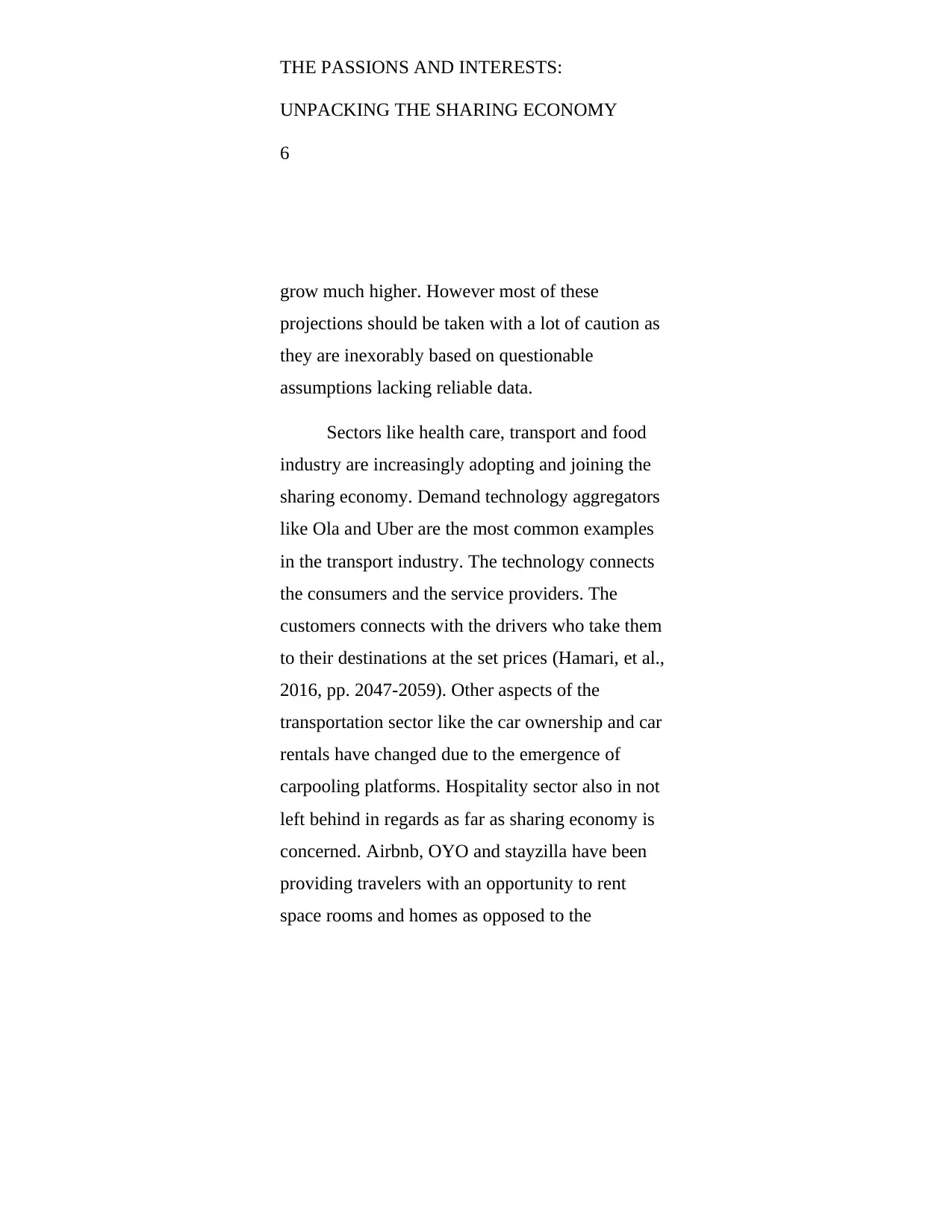
THE PASSIONS AND INTERESTS:
UNPACKING THE SHARING ECONOMY
6
grow much higher. However most of these
projections should be taken with a lot of caution as
they are inexorably based on questionable
assumptions lacking reliable data.
Sectors like health care, transport and food
industry are increasingly adopting and joining the
sharing economy. Demand technology aggregators
like Ola and Uber are the most common examples
in the transport industry. The technology connects
the consumers and the service providers. The
customers connects with the drivers who take them
to their destinations at the set prices (Hamari, et al.,
2016, pp. 2047-2059). Other aspects of the
transportation sector like the car ownership and car
rentals have changed due to the emergence of
carpooling platforms. Hospitality sector also in not
left behind in regards as far as sharing economy is
concerned. Airbnb, OYO and stayzilla have been
providing travelers with an opportunity to rent
space rooms and homes as opposed to the
UNPACKING THE SHARING ECONOMY
6
grow much higher. However most of these
projections should be taken with a lot of caution as
they are inexorably based on questionable
assumptions lacking reliable data.
Sectors like health care, transport and food
industry are increasingly adopting and joining the
sharing economy. Demand technology aggregators
like Ola and Uber are the most common examples
in the transport industry. The technology connects
the consumers and the service providers. The
customers connects with the drivers who take them
to their destinations at the set prices (Hamari, et al.,
2016, pp. 2047-2059). Other aspects of the
transportation sector like the car ownership and car
rentals have changed due to the emergence of
carpooling platforms. Hospitality sector also in not
left behind in regards as far as sharing economy is
concerned. Airbnb, OYO and stayzilla have been
providing travelers with an opportunity to rent
space rooms and homes as opposed to the
⊘ This is a preview!⊘
Do you want full access?
Subscribe today to unlock all pages.

Trusted by 1+ million students worldwide
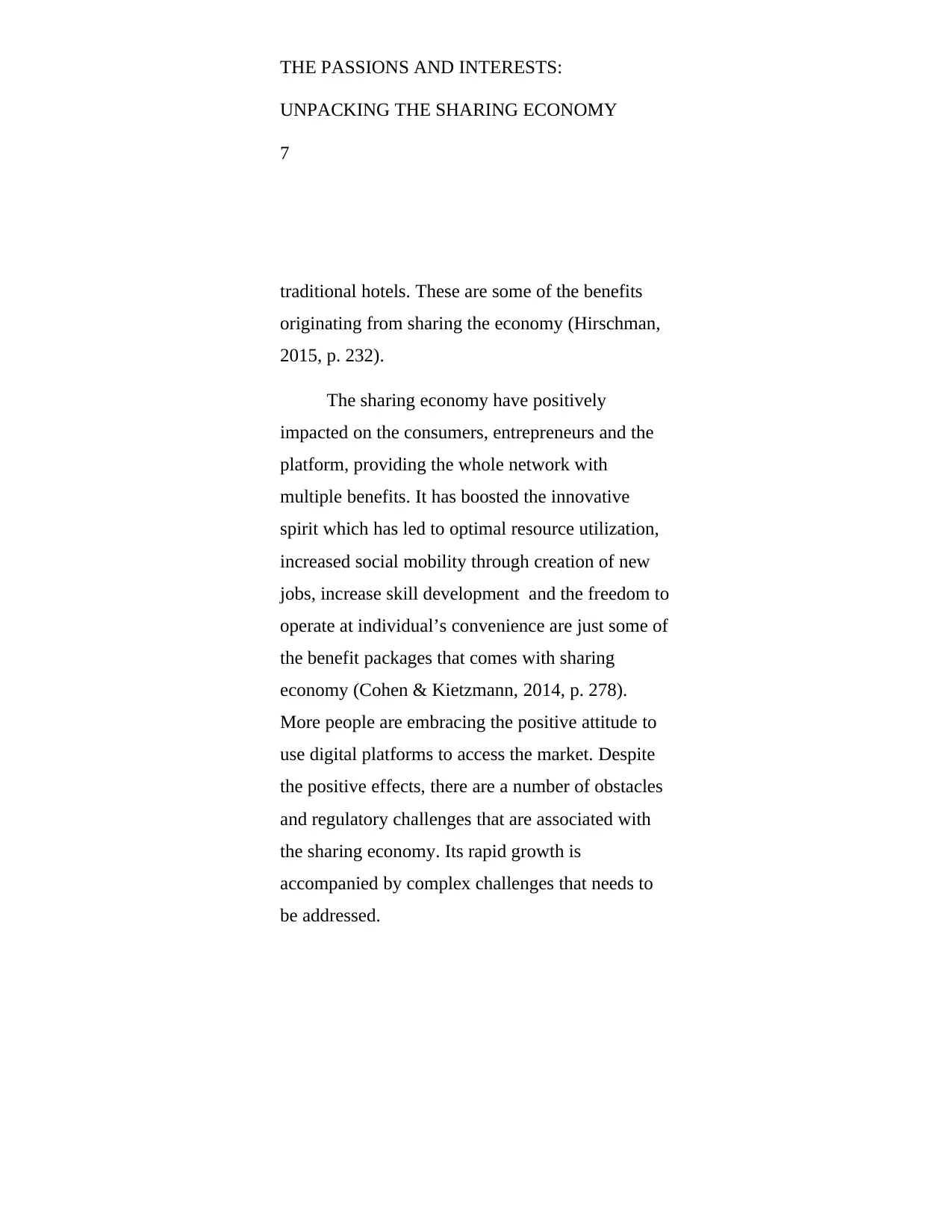
THE PASSIONS AND INTERESTS:
UNPACKING THE SHARING ECONOMY
7
traditional hotels. These are some of the benefits
originating from sharing the economy (Hirschman,
2015, p. 232).
The sharing economy have positively
impacted on the consumers, entrepreneurs and the
platform, providing the whole network with
multiple benefits. It has boosted the innovative
spirit which has led to optimal resource utilization,
increased social mobility through creation of new
jobs, increase skill development and the freedom to
operate at individual’s convenience are just some of
the benefit packages that comes with sharing
economy (Cohen & Kietzmann, 2014, p. 278).
More people are embracing the positive attitude to
use digital platforms to access the market. Despite
the positive effects, there are a number of obstacles
and regulatory challenges that are associated with
the sharing economy. Its rapid growth is
accompanied by complex challenges that needs to
be addressed.
UNPACKING THE SHARING ECONOMY
7
traditional hotels. These are some of the benefits
originating from sharing the economy (Hirschman,
2015, p. 232).
The sharing economy have positively
impacted on the consumers, entrepreneurs and the
platform, providing the whole network with
multiple benefits. It has boosted the innovative
spirit which has led to optimal resource utilization,
increased social mobility through creation of new
jobs, increase skill development and the freedom to
operate at individual’s convenience are just some of
the benefit packages that comes with sharing
economy (Cohen & Kietzmann, 2014, p. 278).
More people are embracing the positive attitude to
use digital platforms to access the market. Despite
the positive effects, there are a number of obstacles
and regulatory challenges that are associated with
the sharing economy. Its rapid growth is
accompanied by complex challenges that needs to
be addressed.
Paraphrase This Document
Need a fresh take? Get an instant paraphrase of this document with our AI Paraphraser
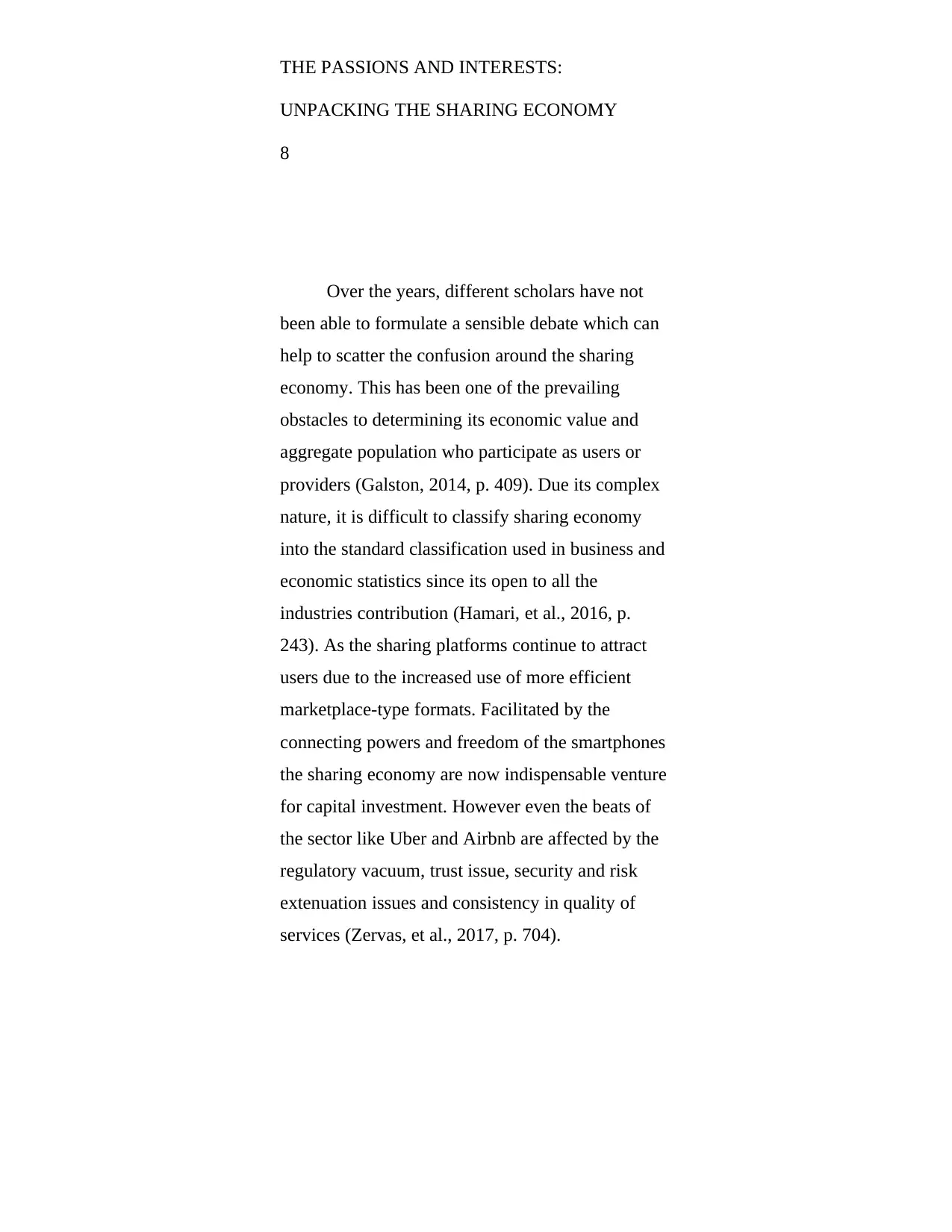
THE PASSIONS AND INTERESTS:
UNPACKING THE SHARING ECONOMY
8
Over the years, different scholars have not
been able to formulate a sensible debate which can
help to scatter the confusion around the sharing
economy. This has been one of the prevailing
obstacles to determining its economic value and
aggregate population who participate as users or
providers (Galston, 2014, p. 409). Due its complex
nature, it is difficult to classify sharing economy
into the standard classification used in business and
economic statistics since its open to all the
industries contribution (Hamari, et al., 2016, p.
243). As the sharing platforms continue to attract
users due to the increased use of more efficient
marketplace-type formats. Facilitated by the
connecting powers and freedom of the smartphones
the sharing economy are now indispensable venture
for capital investment. However even the beats of
the sector like Uber and Airbnb are affected by the
regulatory vacuum, trust issue, security and risk
extenuation issues and consistency in quality of
services (Zervas, et al., 2017, p. 704).
UNPACKING THE SHARING ECONOMY
8
Over the years, different scholars have not
been able to formulate a sensible debate which can
help to scatter the confusion around the sharing
economy. This has been one of the prevailing
obstacles to determining its economic value and
aggregate population who participate as users or
providers (Galston, 2014, p. 409). Due its complex
nature, it is difficult to classify sharing economy
into the standard classification used in business and
economic statistics since its open to all the
industries contribution (Hamari, et al., 2016, p.
243). As the sharing platforms continue to attract
users due to the increased use of more efficient
marketplace-type formats. Facilitated by the
connecting powers and freedom of the smartphones
the sharing economy are now indispensable venture
for capital investment. However even the beats of
the sector like Uber and Airbnb are affected by the
regulatory vacuum, trust issue, security and risk
extenuation issues and consistency in quality of
services (Zervas, et al., 2017, p. 704).
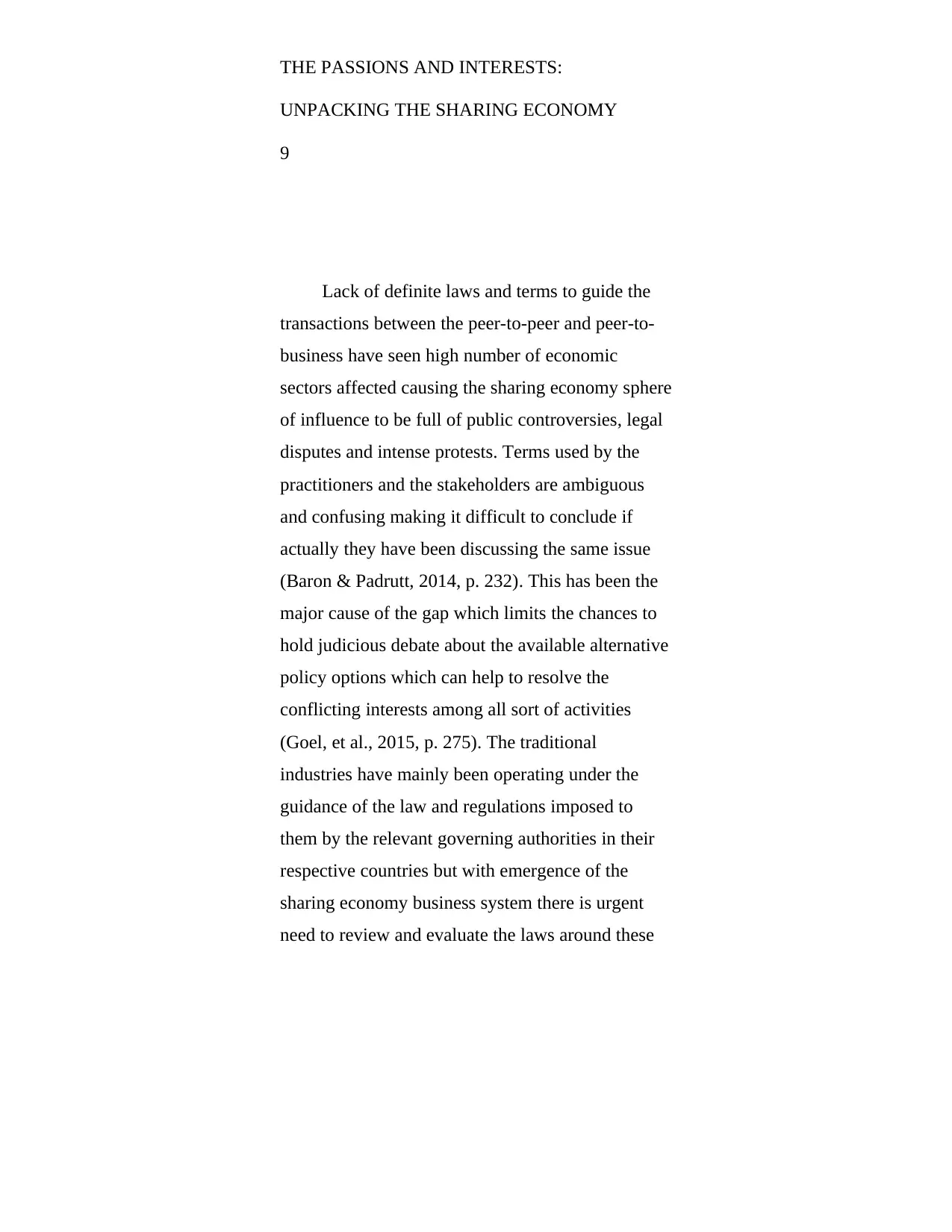
THE PASSIONS AND INTERESTS:
UNPACKING THE SHARING ECONOMY
9
Lack of definite laws and terms to guide the
transactions between the peer-to-peer and peer-to-
business have seen high number of economic
sectors affected causing the sharing economy sphere
of influence to be full of public controversies, legal
disputes and intense protests. Terms used by the
practitioners and the stakeholders are ambiguous
and confusing making it difficult to conclude if
actually they have been discussing the same issue
(Baron & Padrutt, 2014, p. 232). This has been the
major cause of the gap which limits the chances to
hold judicious debate about the available alternative
policy options which can help to resolve the
conflicting interests among all sort of activities
(Goel, et al., 2015, p. 275). The traditional
industries have mainly been operating under the
guidance of the law and regulations imposed to
them by the relevant governing authorities in their
respective countries but with emergence of the
sharing economy business system there is urgent
need to review and evaluate the laws around these
UNPACKING THE SHARING ECONOMY
9
Lack of definite laws and terms to guide the
transactions between the peer-to-peer and peer-to-
business have seen high number of economic
sectors affected causing the sharing economy sphere
of influence to be full of public controversies, legal
disputes and intense protests. Terms used by the
practitioners and the stakeholders are ambiguous
and confusing making it difficult to conclude if
actually they have been discussing the same issue
(Baron & Padrutt, 2014, p. 232). This has been the
major cause of the gap which limits the chances to
hold judicious debate about the available alternative
policy options which can help to resolve the
conflicting interests among all sort of activities
(Goel, et al., 2015, p. 275). The traditional
industries have mainly been operating under the
guidance of the law and regulations imposed to
them by the relevant governing authorities in their
respective countries but with emergence of the
sharing economy business system there is urgent
need to review and evaluate the laws around these
⊘ This is a preview!⊘
Do you want full access?
Subscribe today to unlock all pages.

Trusted by 1+ million students worldwide
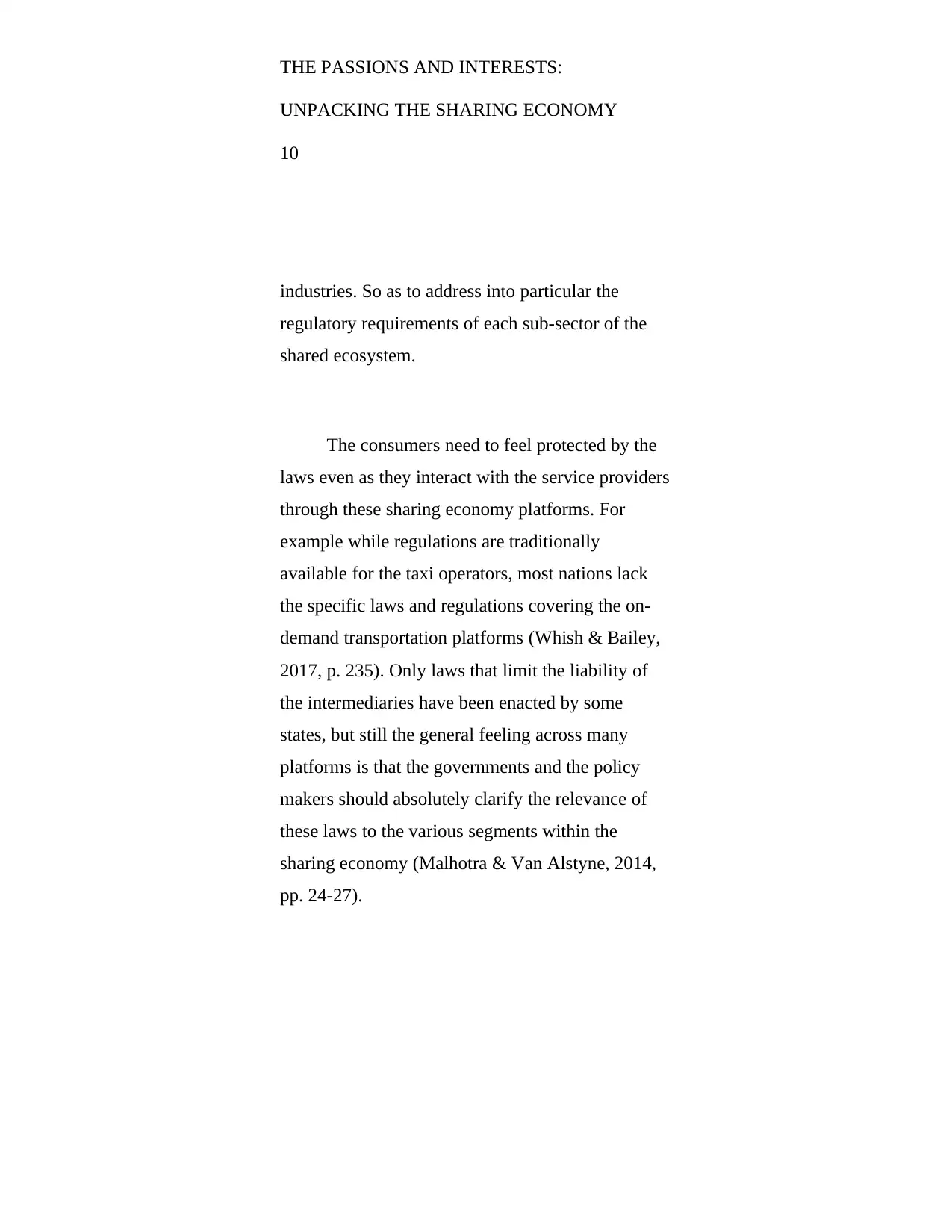
THE PASSIONS AND INTERESTS:
UNPACKING THE SHARING ECONOMY
10
industries. So as to address into particular the
regulatory requirements of each sub-sector of the
shared ecosystem.
The consumers need to feel protected by the
laws even as they interact with the service providers
through these sharing economy platforms. For
example while regulations are traditionally
available for the taxi operators, most nations lack
the specific laws and regulations covering the on-
demand transportation platforms (Whish & Bailey,
2017, p. 235). Only laws that limit the liability of
the intermediaries have been enacted by some
states, but still the general feeling across many
platforms is that the governments and the policy
makers should absolutely clarify the relevance of
these laws to the various segments within the
sharing economy (Malhotra & Van Alstyne, 2014,
pp. 24-27).
UNPACKING THE SHARING ECONOMY
10
industries. So as to address into particular the
regulatory requirements of each sub-sector of the
shared ecosystem.
The consumers need to feel protected by the
laws even as they interact with the service providers
through these sharing economy platforms. For
example while regulations are traditionally
available for the taxi operators, most nations lack
the specific laws and regulations covering the on-
demand transportation platforms (Whish & Bailey,
2017, p. 235). Only laws that limit the liability of
the intermediaries have been enacted by some
states, but still the general feeling across many
platforms is that the governments and the policy
makers should absolutely clarify the relevance of
these laws to the various segments within the
sharing economy (Malhotra & Van Alstyne, 2014,
pp. 24-27).
Paraphrase This Document
Need a fresh take? Get an instant paraphrase of this document with our AI Paraphraser
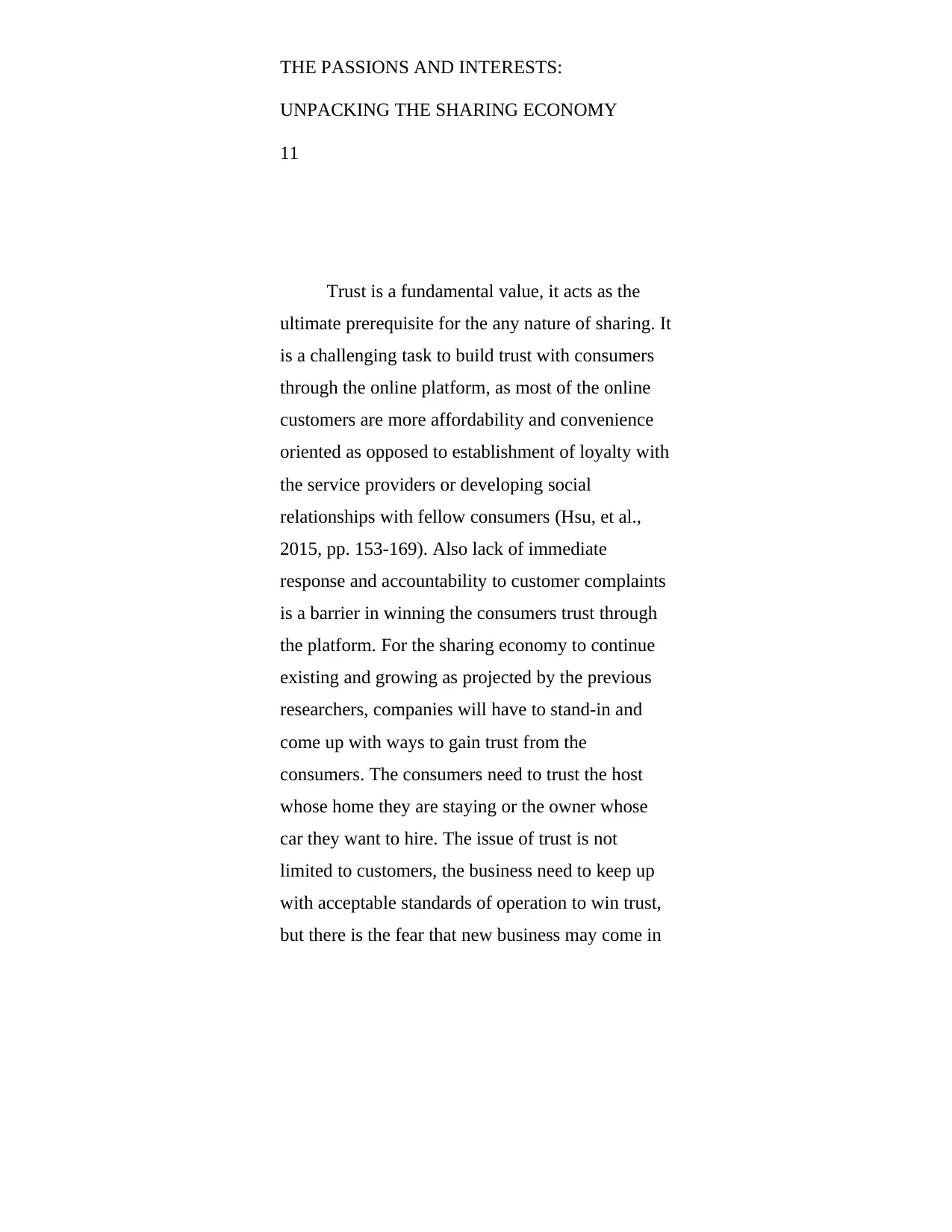
THE PASSIONS AND INTERESTS:
UNPACKING THE SHARING ECONOMY
11
Trust is a fundamental value, it acts as the
ultimate prerequisite for the any nature of sharing. It
is a challenging task to build trust with consumers
through the online platform, as most of the online
customers are more affordability and convenience
oriented as opposed to establishment of loyalty with
the service providers or developing social
relationships with fellow consumers (Hsu, et al.,
2015, pp. 153-169). Also lack of immediate
response and accountability to customer complaints
is a barrier in winning the consumers trust through
the platform. For the sharing economy to continue
existing and growing as projected by the previous
researchers, companies will have to stand-in and
come up with ways to gain trust from the
consumers. The consumers need to trust the host
whose home they are staying or the owner whose
car they want to hire. The issue of trust is not
limited to customers, the business need to keep up
with acceptable standards of operation to win trust,
but there is the fear that new business may come in
UNPACKING THE SHARING ECONOMY
11
Trust is a fundamental value, it acts as the
ultimate prerequisite for the any nature of sharing. It
is a challenging task to build trust with consumers
through the online platform, as most of the online
customers are more affordability and convenience
oriented as opposed to establishment of loyalty with
the service providers or developing social
relationships with fellow consumers (Hsu, et al.,
2015, pp. 153-169). Also lack of immediate
response and accountability to customer complaints
is a barrier in winning the consumers trust through
the platform. For the sharing economy to continue
existing and growing as projected by the previous
researchers, companies will have to stand-in and
come up with ways to gain trust from the
consumers. The consumers need to trust the host
whose home they are staying or the owner whose
car they want to hire. The issue of trust is not
limited to customers, the business need to keep up
with acceptable standards of operation to win trust,
but there is the fear that new business may come in
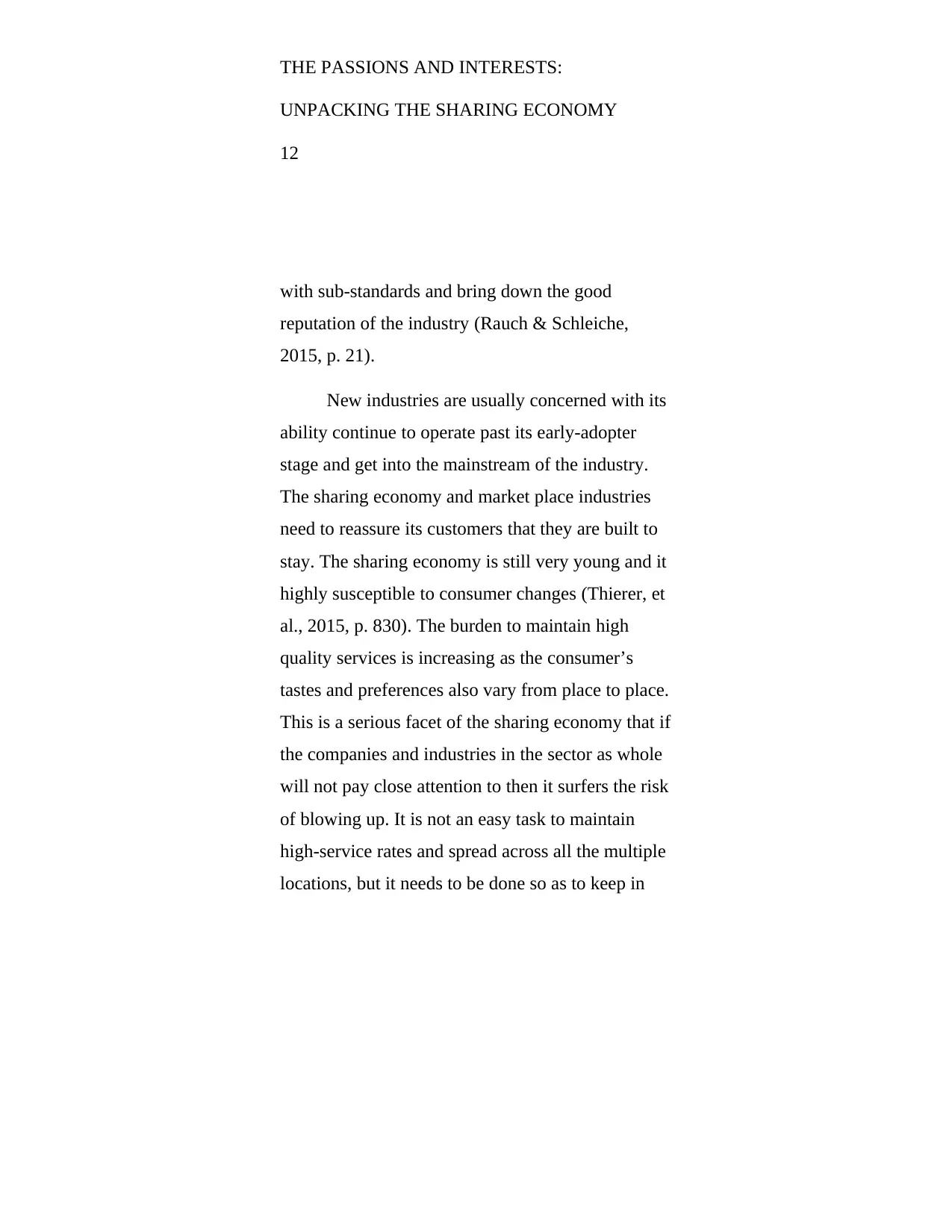
THE PASSIONS AND INTERESTS:
UNPACKING THE SHARING ECONOMY
12
with sub-standards and bring down the good
reputation of the industry (Rauch & Schleiche,
2015, p. 21).
New industries are usually concerned with its
ability continue to operate past its early-adopter
stage and get into the mainstream of the industry.
The sharing economy and market place industries
need to reassure its customers that they are built to
stay. The sharing economy is still very young and it
highly susceptible to consumer changes (Thierer, et
al., 2015, p. 830). The burden to maintain high
quality services is increasing as the consumer’s
tastes and preferences also vary from place to place.
This is a serious facet of the sharing economy that if
the companies and industries in the sector as whole
will not pay close attention to then it surfers the risk
of blowing up. It is not an easy task to maintain
high-service rates and spread across all the multiple
locations, but it needs to be done so as to keep in
UNPACKING THE SHARING ECONOMY
12
with sub-standards and bring down the good
reputation of the industry (Rauch & Schleiche,
2015, p. 21).
New industries are usually concerned with its
ability continue to operate past its early-adopter
stage and get into the mainstream of the industry.
The sharing economy and market place industries
need to reassure its customers that they are built to
stay. The sharing economy is still very young and it
highly susceptible to consumer changes (Thierer, et
al., 2015, p. 830). The burden to maintain high
quality services is increasing as the consumer’s
tastes and preferences also vary from place to place.
This is a serious facet of the sharing economy that if
the companies and industries in the sector as whole
will not pay close attention to then it surfers the risk
of blowing up. It is not an easy task to maintain
high-service rates and spread across all the multiple
locations, but it needs to be done so as to keep in
⊘ This is a preview!⊘
Do you want full access?
Subscribe today to unlock all pages.

Trusted by 1+ million students worldwide
1 out of 24
Related Documents
Your All-in-One AI-Powered Toolkit for Academic Success.
+13062052269
info@desklib.com
Available 24*7 on WhatsApp / Email
![[object Object]](/_next/static/media/star-bottom.7253800d.svg)
Unlock your academic potential
Copyright © 2020–2026 A2Z Services. All Rights Reserved. Developed and managed by ZUCOL.



